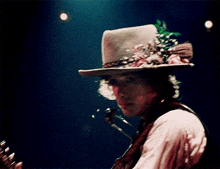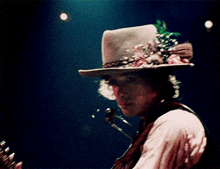Just like Dylan, none of this film makes total sense but it’s arresting all the same. If there’s anything that can be said about Renaldo and Clara, it’s that it’s one of the most specifically ‘70s films out there and it truly feels like the world as seen by Dylan, a man who many (even diehard fans) find challenging to understand. And if this film can teach you anything about Dylan as an artist, it’s that he has always been zoned in on the distinction between fact and truth. Going back to his earliest songs, he often put himself in not only the shoes of real and fictional characters, but the souls of them, and either created or revisited their stories to bring new life into them.
Dylan may appear socially unintelligible but he’s so incredibly conscious of the world around him, and his directorial focus on the small interactions staged for this film are proof of his end-all when it comes to storytelling, which is letting everything unravel itself and building a narrative around that. Admittedly, it’s quite a daunting movie to sit down and watch, even for a big Dylan fan such as myself (I watched it over the course of three days), but if one thing’s for sure, it’s that Dylan visually captured both what this tour felt like — mystifying and surreal — and the mood this era in his catalog gives off — cryptic yet direct, with a transformative nature each time the songs are performed.
Scorsese’s Rolling Thunder Revue documentary is certainly a better film, and I think the interviews in that — which are sometimes mysterious and coded in their own right — compensate for its lack of vignettes. Regardless, Renaldo and Clara is worth a watch for a look into the circus of darkness and intrigue that drove the Rolling Thunder Revue: the bizarre clear plastic mask Dylan wears on stage as the opening credits roll, the one-on-one conversations between people with drifter-like mindsets, the footage of the beautiful Joan Baez singing and acting in a semi-autobiographical way, and much more. But as a fair disclaimer, this can’t be enjoyed if you don’t know the context of Dylan’s life and work in the mid-1970s (I’m not being snobby; it’s so you don’t potentially waste your time more than anything).
11/13/24





